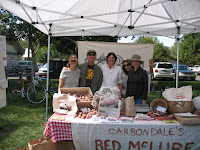The following has been adapted from the application to board the Red McClure on to Slow Food's Ark of Taste. After the tasting panel met in the fall of 2010 the Red McClure was unanimously voted onto the Ark. Slow Food Roaring Fork is currently working to gain the potato's acceptance onto the International Ark of Taste as well as creating a Slow Food Presidium recognizing the Carbondale, Colorado area as the historic growing region of the Red McClure.
The Red McClure is an heirloom red skinned, white flesh potato developed by Thomas McClure as a sport of the Peachblow potato. Recognized for both its superior taste and cooking qualities, the Red McClure boasts a unique flavor and adaptability to various cooking methods. It has medium to deep eyes and varies in size from very small to large sized spuds. It has been replaced in the market by “typier” potatoes: ones with darker skin, fewer blemishes and much shallower eyes.
 |
| A full load |
E.H. Grubb in his 1912 book The Potato best sums it up: “The Roaring Fork and Crystal River Valley section of Colorado is as nearly perfect in soil conditions as can be found, and the potatoes grown there are not excelled anywhere in the world, and are equaled in but few places.” While E.H. Grubb was a Carbondale resident, he was also one of the premier potato specialists of the day and served as Vice President of the Potato Association of America and was the Special Commissioner to Europe in Potato Investigations for the U.S. Government.
 |
| Talk about potatoes! |
In the early 1900’s the Russet Burbank potato, one of the most widely known and grown potatoes in America, was selected by Lou Sweet on his ranch outside of Carbondale, Colorado as a natural mutation of the Burbank variety. While the historic import of potato growing in this region is undeniable, the current lack of agriculture (and potato growing specifically) is a threat to this heritage.
Without the continued support of Slow Food Roaring Fork, access to grow and consume Red McClures in the decades to come is unlikely. Our goal is to see to it that the Red McClure’s existence is self-sustaining. We aim to promote the potato so that local growers have the opportunity to market the historic aspects of the potato along side its superior culinary characteristics. Through local awareness we have already created a short-term demand for the potato. We aim to make this demand more long-term and to create the methods needed to ensure the availability of the potato to all who wish to participate in its revival. As the potato has not been grown under significant acreage in quite some time, the technical side of production still demands attention. We hope to work with Colorado State University’s San Luis Valley Research Center on the growing conditions and (organic) practices suited to the Red McClure in the Roaring Fork Valley.
 |
| The Selling Squad |
There has been enormous support from growers and consumers alike for the Red McClure potato. At the centenary anniversary of Carbondale’s annual Potato Days festival in the fall of 2009, Slow Food Roaring Fork sold over 300 pounds of organic Red McClures in a single day. We firmly believe that the Red McClure deserves a permanent presence in our area’s current culinary vernacular. Inclusion on the International Ark of Taste and the creation of a Presidium would help create the demand needed to ensure a steady supply of seed in the market so that Slow Food Roaring Fork can step away from the incubation of this initiative and focus on widening the growing potential here in our own valley.







No comments:
Post a Comment